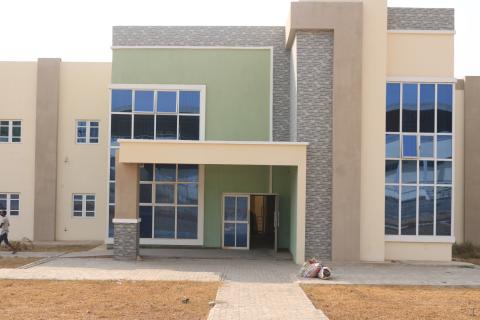
When operations at the headquarters of the National Open University of Nigeria (NOUN) moved from its temporary base in Victoria Island, Lagos, in 2016 to its permanent one in Jabi, Abuja, the environment was literally in its embryonic state as it housed barely seven structures with acres of virgin land laying fallow.
Eight years down the line, the institution’s seat of power metamorphosed to an enviable state, thanks to the successive university managements’ commitments and foresight in providing befitting structures akin to what is obtained in universities the world over.
The epoch-making relocation of the headquarters, which took place in the early days of the Prof. Abdalla Uba Adamu’s stewardship, marked a significant turning point in the quick-fire explosion of projects that culminated in now having an ultra-modern central library, huge faculty blocks, the media centre, NOUN Printing Press, School of Postgraduates Studies, and many others.
The pace of the accelerated development continued with even greater vigour with the coming of the incumbent Vice-Chancellor, Prof. Olufemi Peters, who wasted no time in completing the inherited projects and initiated many more strategic structures aimed at rather smoothening operations at the West Africa’s premier Open and Distance Learning (ODL) institution.
It is noteworthy, however, to remember that the arrival of the NOUN headquarters in the area has since paved the way for similar moves by sister agencies, as the next-door neighbour, the Economic and Financial Crimes Commission (EFCC) quickly followed suit when it completed the work at its headquarters and moved in. Ever since, more than three federal agencies have relocated to their offices in the vicinity, turning the Research and Institutions District in the Nnamdi Azikiwe Express way, Jabi, one of the fastest-developing areas of the Federal Capital Territory (FCT).
According to the Coordinator, Project Monitoring and Evaluation Unit in the Directorate of Physical Development, Works & Services (DPDW&S) of the university, Arc Sulaiman Haruna,
when NOUN made the pivotal move to Abuja in 2016, it served as a catalyst for infrastructural growth. The institution invested heavily in modern facilities, including state-of-the-art administrative buildings.
Haruna said there were only seven blocks/buildings when the headquarters first arrived in Abuja from Lagos, but ever since, 10 more buildings have already been completed, with five currently under various stages of work.
The take off structures established in 2016 included the faculty block, Administrative Buildings I and II, Senate Building, OPD Building, Mosque and the Convocation Arena. These structures formed the nucleus of the institution’s presence in its new headquarters.
Over the past eight years, NOUN has demonstrated a steadfast commitment to growth and innovation. Several noteworthy structures have been erected, contributing to the institution’s infrastructure and operational capacity. Among these additions were the Media Centre and Printing Press established in 2018, the Warehouse/Store and Drivers’ Lounge in 2019, and the University Bookshop/Warehouse Unit in the same year. These facilities not only enhance administrative and logistical functions but also support academic and student services.
In 2020, NOUN further solidified its infrastructure with the construction of the Central Library and Recreational Area; providing students and staff with vital resources and spaces for learning, research, and relaxation. Additionally, the establishment of the Faculty Building and Administrative Office Block in 2020 and 2021, respectively underscores the institution’s commitment to academic excellence and administrative efficiency.
NOUN News correspondent observed that the university has embarked on several projects, with some of them awaiting the official commissioning, while others are still ongoing, as stated by the coordinator.
They include the development of a Virtual Facilitation Lab, construction of the Faculty of Management Sciences and School of Postgraduate Studies, Directorate of Learning Content Management Systems, and initiatives such as the Security House and Student Support Centre, ACETEL’s Smart Building and the renovation of the Convocation Arena.
These projects signify NOUN’s proactive approach towards modernising its facilities and adapting to the evolving landscape of education. The management, in its wisdom, was also strategically placing the university in a position that would continue to bolster its academic and operational capabilities.
Asked whether the DPDW&S has been involved in any similar project at the study centres, the coordinator answered in affirmative, saying that three similar buildings have been completed by the university at some study centres.
On the utilisation of the remaining spaces at the headquarters, Haruna said there is a suggestion that the university should henceforth begin “to be mindful in the use of land. It may be wise to consider vertical expansion where feasible.”
Perhaps, this is what informed the possible merger of certain directorates/departments in some of the new structures, as the coordinator disclosed that the management is to decide on the number of directorates to occupy each structure.
A DPDW&S staff, who was among those that relocated to Abuja and preferred anonymity, expressed delight in witnessing the evolution of the institution’s infrastructure and operational capacity over the past eight years.
“From the establishment of modern facilities to the expansion of academic and administrative departments, staff members have acknowledged the collective effort and dedication that contributed to NOUN’s progress,” he said.
Another staff from the Directorate of Media and Publicity on condition not to be named, attested to the institution’s commitment in providing state-of-the-art facilities toward supporting teaching, learning and research activities.
Indeed, it goes without saying that the move to Abuja has provided NOUN with a more centralised, visible and befitting location that enhances accessibility for students as well as facilitates collaborations with governmental and non-governmental organisations. It certainly laid the groundwork for the unprecedented expansion and development being witnessed today.

